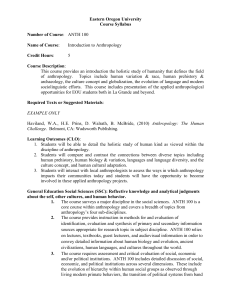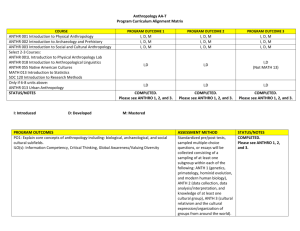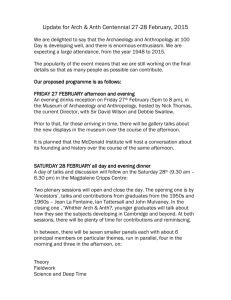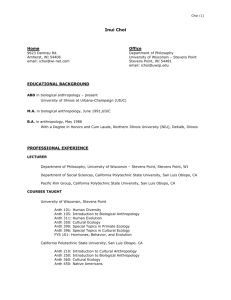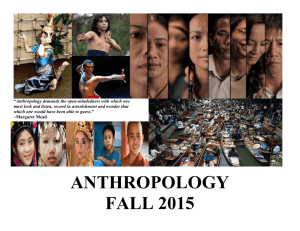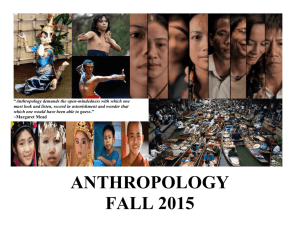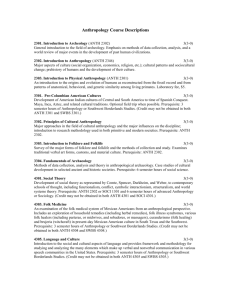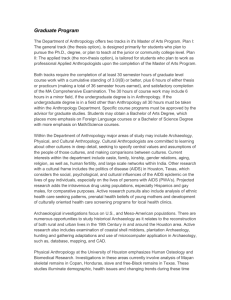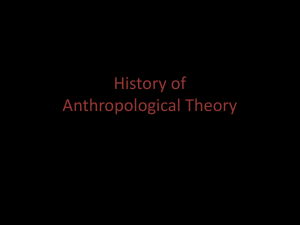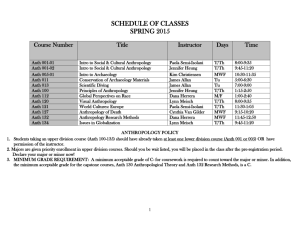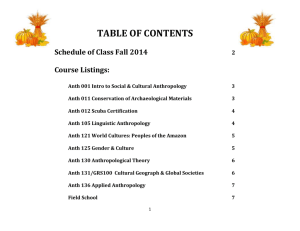Anthropology - California State University, East Bay
advertisement
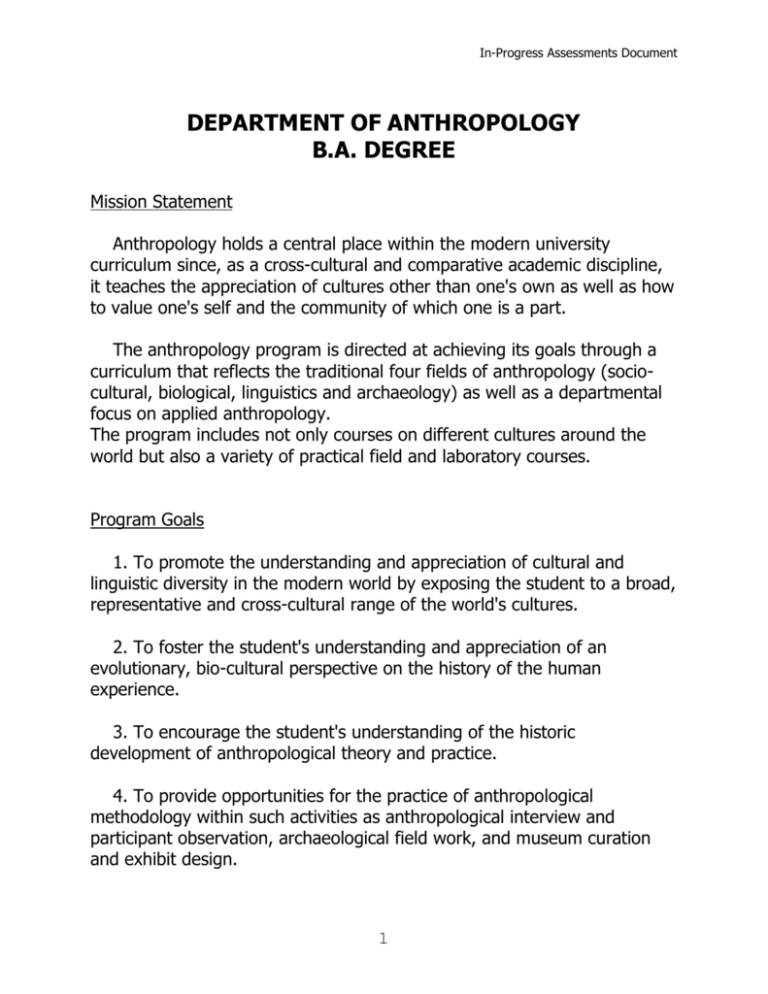
In-Progress Assessments Document DEPARTMENT OF ANTHROPOLOGY B.A. DEGREE Mission Statement Anthropology holds a central place within the modern university curriculum since, as a cross-cultural and comparative academic discipline, it teaches the appreciation of cultures other than one's own as well as how to value one's self and the community of which one is a part. The anthropology program is directed at achieving its goals through a curriculum that reflects the traditional four fields of anthropology (sociocultural, biological, linguistics and archaeology) as well as a departmental focus on applied anthropology. The program includes not only courses on different cultures around the world but also a variety of practical field and laboratory courses. Program Goals 1. To promote the understanding and appreciation of cultural and linguistic diversity in the modern world by exposing the student to a broad, representative and cross-cultural range of the world's cultures. 2. To foster the student's understanding and appreciation of an evolutionary, bio-cultural perspective on the history of the human experience. 3. To encourage the student's understanding of the historic development of anthropological theory and practice. 4. To provide opportunities for the practice of anthropological methodology within such activities as anthropological interview and participant observation, archaeological field work, and museum curation and exhibit design. 1 In-Progress Assessments Document 5. To facilitate the academic skills of critical thinking and argumentation, articulate oral and written expression, and library research. 6. To graduate majors that not only possess the values, knowledge, and skills listed above, but are committed to a career of life-long learning. UNRESOLVED GOALS (whether to include and/or how to assess) • To teach students how to recognize and combat ethnocentrism. • To formally embrace Applied Anthropology as an integral part of the undergraduate curriculum. • To encourage familiarity with other cultures through study abroad or an internationally focused internship. Student Learning Outcomes A. The Anthropology graduate should be able to demonstrate understanding and appreciation of issues of human biological, cultural and linguistic diversity across space and through time. (Goals 1 and 2) B. The Anthropology graduate should demonstrate understanding of the growth of anthropological thought and the unique methods used in anthropological fieldwork. (Goals 3 and 4) C. The Anthropology graduate should demonstrate both articulate communication (written and oral) skills as well as the academic skills of critical thinking, argumentation, and library research. (Goals 5 and 2 In-Progress Assessments Document UNRESOLVED OUTCOMES (if the goals dealing with the following issues are included, learning outcomes will need to be developed) • Ethnocentrism • Applied anthropology • Study abroad Performance Indicators A. The Anthropology graduate will demonstrate in-depth knowledge of human biological (1), cultural (2) and linguistic (3) diversity by means of: 1. Reading at least two monograph-length ethnographies and viewing at least two ethno-graphic films of at least two nonWestern cultures. The student will demonstrate knowledge of other works through essays written either as term papers, critical book reviews, exam essays, museum exhibits, or classroom presentation or a diversified combination of these methods. Meeting the above requirements could be accomplished in ANTH 1300, 3400, 3710, 3730, 3760 and the 3500 series of courses. B. The Anthropology graduate will demonstrate in-depth knowledge of the schools of anthropological thought and methods of anthropological fieldwork by successfully completing requirement #1 and either #2 or #3 below: 1. Writing a term paper which explores the history and implementation of key anthropological concepts (within a forum such as ANTH 4910). 2. Writing a term paper based on original ethnographic field research (within a forum such as ANTH 4310). 3 In-Progress Assessments Document 3. Writing a term paper based on original archaeological field research (within a forum such as ANTH 4250). C. The Anthropology graduate will demonstrate ability to analyze and effectively communicate understanding of anthropological concepts by means of: 4 In-Progress Assessments Document DEPARTMENT OF ANTHROPOLOGY -ASSESSMENT YEAR 2001-2002 OUTCOMES ANALYSIS OUTCOME CODING DEPT DESCRIPTION ANTH Demonstrate advanced critical thinking and argumentation skills as related to anthropology. Demonstrate advanced oral expression skills as related to anthropology. Demonstrate advanced written expression skills as related to anthropology. Know how to recognize ethnocentrism. ANTH ANTH ANTH ANTH ANTH ANTH ANTH ANTH ANTH ANTH ANTH Appreciate the value of an evolutionary, transtemporal perspective on the human condition. Understand the fundamental mechanisms of the evolutionary process. Understand the major events of human evolutionary development. Understand the major events of prehistoric cultural development. Understand the unique and synthetic nature of anthropology's bio-cultural perspective. Take action against ethnocentrism. Gain familiarity with one or more foreign cultures and languages via study abroad. Engage in the practice of anthropological methodology by participating in one or more anthropological practica. Primary Code Secondary Code Knowledge Skill AGE-CT S AGE-O S AGE-O S Disposition DESCRIPTION OF CODE Advanced General Education - Critical Thinking Advanced General Education - Oral Communication AK SJD Area Knowledge & Social Justice/Diverstiy K AK D DK K DK K DK K DK K Area Knowledge Discipline Knowledge ECR D FE S FE S MIQl S Ethics/Civic Responsibility Field Experience ANTH Demonstrate advanced research skills as related to anthropology. Demonstrate intellectual inquisitiveness. ANTH Demonstrate a disposition toward life-long learning. ANTH Understand cultural and linguistic diversity. SJD ANTH Value cultural and linguistic diversity. SJD ANTH OUTCOME Methods of Inquiry - Qualitiative SDL D SDL D K D 5 Self-Directed Learner Social Justice/Diversity
